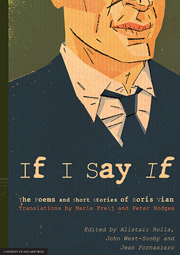Book contents
- Frontmatter
- Contents
- Foreword
- Boris Vian: A Life in Paradox
- Note on the Texts
- Part I The Poetry of Boris Vian
- Part II The Short Stories of Boris Vian
- Part III On Translating Boris Vian
- On Not Wanting to Die: Translation as Resurrection
- Determining a Strategy for the Translation of Boris Vian
- Notes to the Poems
- Notes to the Short Stories
- Bibliography of Works Cited
On Not Wanting to Die: Translation as Resurrection
from Part III - On Translating Boris Vian
Published online by Cambridge University Press: 05 September 2014
- Frontmatter
- Contents
- Foreword
- Boris Vian: A Life in Paradox
- Note on the Texts
- Part I The Poetry of Boris Vian
- Part II The Short Stories of Boris Vian
- Part III On Translating Boris Vian
- On Not Wanting to Die: Translation as Resurrection
- Determining a Strategy for the Translation of Boris Vian
- Notes to the Poems
- Notes to the Short Stories
- Bibliography of Works Cited
Summary
Even though Vian did not himself choose the title Je voudrais pas crever for the volume of his collected poetry — it was published posthumously in 1962 — it is a title that most fittingly captures the core premise of the book. Je voudrais pas crever (I wouldn't wanna die) encompasses, firstly, the two great contrasts in Vian's all too short existence: his passion for life and the memento mori with which he lived and which permeates this little volume of poetry. I say “little” because the book is small: the French 1972 edition contains only twenty-three poems, and in addition some writings on the Collège de 'Pataphysique, not included here. Little, also, because it appears, deceptively, to be a light read. Certainly, it is easy to be fooled by Vian's playfulness and jocularity, by his pun and word play, and by his own reiterated assertions that he is “no great poet”. But Vian's work is anything but slight. The complexities at play are manifold and full of contrasts: his boyish charm, childishness and penchant for vulgarity coexist with a genuine despair and with that other side of childishness that is marked by sincerity — a way of looking at the world with awe and through the lens of a wonderful imagination.
With the notable exception of some of Vian's songs, disappointingly few of his poems have been translated into English.
- Type
- Chapter
- Information
- If I Say IfThe Poems and Short Stories of Boris Vian, pp. 299 - 306Publisher: The University of Adelaide PressPrint publication year: 2014

